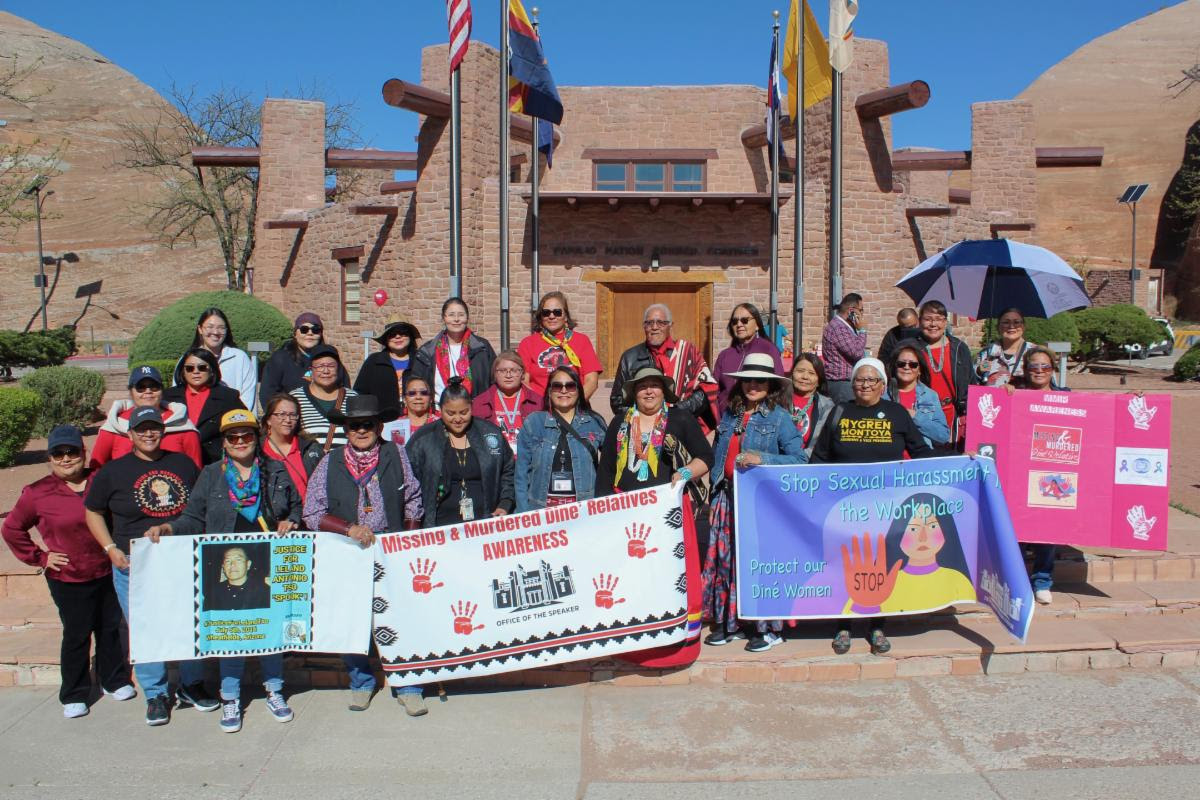
- Details
- By Native News Online Staff
Navajo Nation Speaker Crystalyne Curley recalled on Thursday that her grandfather warned her family that Navajo women were taken from the community and never returned.
“The issue of Missing and Murdered Diné Relatives is not a new crisis. It’s rooted in colonization where many of our ancestors faced violence, abuse, and kidnapping,” Speaker Curley said. “My grandfather has talked about our women being taken to never return home. It’s been generations that our people have been carrying this pain.”
Speaker Curley and the 25th Navajo Nation Council joined community members in a march to show solidarity with families of Missing and Murdered Diné Relatives (MMDR).
Speaker Curley said one objective of the march was to foster support and healing for impacted families.
Law and Order Committee Chair Eugenia Charles-Newton supported the voices of those who speak out against harassment and abuse. Chair Charles-Newton said that she was walking to take a stand against sexual harassment in the workplace, and that often those who speak up are looked upon as disruptors or agitators.
“Sometimes when you speak out against this issue, you’re looked upon as the bad guy. I don’t believe that. We need to step up and say something. I’m here today to say that I don’t condone this action,” Chair Charles-Newton said. “Speaking out and being blamed is not right. We need to stop root causes like stalking, domestic violence, and harassment in the workplace.”
The march started at the Navajo Nation Museum and ended in front of the Navajo Nation Council Chamber with advocates speaking on the crisis.
In front of the Council Chamber, Missing and Murdered Diné Relatives (MMDR) Task Force Chair Amber Kanazbah Crotty delivered a message of hopeful determination considering this current crisis that faces the Nation.
“For our advocates today, I want to highlight and uplift the movements we are a part of like the MMDR Task Force. It’s the families that have been directly impacted who have created this movement. It’s not a movement for political gain. It’s a movement for restoration, resilience, and for our healing,” Chair Crotty said.
Several individuals impacted by the MMDR crisis shared their stories of loved ones who have gone missing or were tragically murdered without resolve.
“We need to fight the fight that some don’t have strength for,” Speaker Curley said. “Thanks for having the strength and prayers to support one another. We’re healing together.”
More Stories Like This
Native News Weekly (August 25, 2024): D.C. BriefsNavajo Nation Mourns the Passing of Former Vice President Rex Lee Jim
Deb Haaland Earns Endorsement From Communications Workers of America Local 7076
University Soccer Standout Leads by Example
Two Native Americans Named to Democratic Congressional Campaign Committee's“Red to Blue” Program
Help us defend tribal sovereignty.
At Native News Online, our mission is rooted in telling the stories that strengthen sovereignty and uplift Indigenous voices — not just at year’s end, but every single day.
Because of your generosity last year, we were able to keep our reporters on the ground in tribal communities, at national gatherings and in the halls of Congress — covering the issues that matter most to Indian Country: sovereignty, culture, education, health and economic opportunity.
That support sustained us through a tough year in 2025. Now, as we look to the year ahead, we need your help right now to ensure warrior journalism remains strong — reporting that defends tribal sovereignty, amplifies Native truth, and holds power accountable.
 The stakes couldn't be higher. Your support keeps Native voices heard, Native stories told and Native sovereignty defended.
The stakes couldn't be higher. Your support keeps Native voices heard, Native stories told and Native sovereignty defended.
Stand with Warrior Journalism today.
Levi Rickert (Potawatomi), Editor & Publisher


